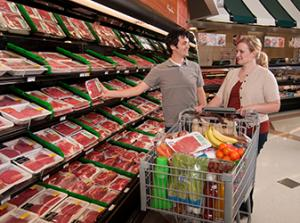We need more rural meat processors, By Dan Murphy
Meat of the Matter: State of the industry
By Dan Murphy September 08, 2016 | 2:28 pm EDT
In the old days — like the 1970s — there were hundreds of small-scale packing plants throughout the rural areas in most states. If you were a farmer raising some cattle or a couple pens of pigs, you could load them up on a trailer and head off to a plant that was often not far away.
In addition, many states operated their own state meat inspection systems, with state inspectors and state-run inspection rules. Although such systems had to conform to USDA standards, the meat products could not be sold across state lines, which wasn’t a big problem when there were numerous independent retailers willing to stock their meat cases with local foods.
Unfortunately, that was long before locavores banging the drum about buying foods grown close to home became numerous enough to leverage the procurement priorities of national supermarket retailers.
Not only that, but the emergence of mandatory Hazard Analysis Critical Control Points (HACCP) programs in the 1980s effectively shut down many marginally profitable operations, and the liabilities created by food-borne outbreaks forced even the biggest independent packers to merge, sell out or otherwise find a way to unload their assets onto a larger corporation with the resources to withstand the financial impact and the negative publicity in the wake of massive product recalls the food-safety incidents spawned.
Ironically, even as locally sourced foods gained an aura of attractiveness, small-scale packing plants were disappearing faster than Ryan Lochte’s endorsement deals.
Along with many state inspection programs. Over the last 30 years, cash-strapped legislators increasingly asked, why fund a meat inspection program with state tax dollars when those duties can just be handed over to the feds?
Options are Limited
There has been some movement to counter the macro-trends that have wiped most small packing plants off the rural landscape. As both an economic driver and as a support for its agricultural base, some states have tried to resurrect state inspection programs.
New Hampshire, for example, created its own meat inspection system in 2011 because the state was down to only a single USDA-inspected facility.
As The Concord Monitor noted in a review, demand was outpacing slaughtering appointments. Farmers were forced to either travel long distances to reach out-of-state plants, or maintain their animals for several months beyond maturity as they waited for a local opening to have them processed.
“We were worried USDA would start pulling out the inspectors from the small meat states,” the newspaper quoted Rep. Bob Haefner, the state Agriculture Committee Chairman.
Despite the urgency of the situation for New Hampshire’s farmers, the state inspection program never received any funding, and it was never implemented.
The state’s House and Senate members are now trying to rework that meat inspection law to “clarify” the statute. But, as House Environment and Agriculture Committee member Rep. Tara Sad told the newspaper, “Here we sit.”
It’s unlikely that the program will ever be implemented, especially after three more USDA-certified plants have opened in the state since 2012.
With the growing popularity of grassfed beef, heritage hogs and various exotic meats, such as buffalo, it seems that technology ought to provide a solution to the bottleneck that currently exists almost everywhere for smaller producers wanting to market specialty meats direct to consumers.
Look what the development of small, self-contained brewery systems did to the beer industry. From half a dozen national brands 30 years ago, plus a few regional survivors — many of which were actually owned by the industry giants — there are now literally thousands of labels, hundreds of start-ups and not a city, town or hamlet in the entire country that doesn’t have a brewpub serving some exotic beer cooked up in the backroom or down the street in someone’s garage.
If a turnkey processing system could be developed that required only utilities hook-ups and a few trained workers to operate, what is now a fringe sector of the business — high-end specialty meats — could become a thriving business for thousands of farmers and entrepreneurs in rural America.
The barrier to expanding that end of the business isn’t demand, it’s supply.
It would be useful to have states offer their own meat inspection programs to support small-scale plants — especially since those products could now be deemed equal to USDA-inspected products and sold nationally.
But that won’t help unless there are plants relatively close to the farms and ranches where the livestock are raised.
We don’t need a packing plant in every town, but it would be nice to have a couple more in every state.
The opinions expressed in this commentary are solely those of Dan Murphy, a veteran food-industry journalist and commentator.
